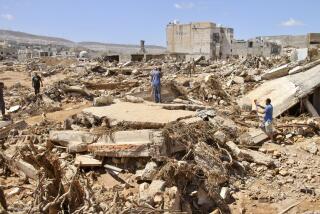Libya Puts $2.7-Billion Price on Flight 103
- Share via
WASHINGTON — In a bold attempt to get off the U.S. terrorism list, Libya is offering $10 million in compensation for each victim of the 1988 midair bombing of Pan Am Flight 103, which killed 270 people, U.S. officials and lawyers for the families say.
The Libyan offer to pay a total of $2.7 billion in compensation is also contingent on the lifting of sanctions that have been imposed against the North African nation by the United States and the United Nations, U.S. officials said.
Under the plan, the government of Moammar Kadafi would pay $4 million per victim when the U.N. sanctions are lifted, $4 million with the removal of the U.S. sanctions and the final $2 million when Libya is taken off the State Department’s list of state sponsors of terrorism.
Once the sanctions are lifted and his country is removed from the terrorism list, experts say, Kadafi could be expected to try to resume trade with the United States in oil and other goods, win access to much-needed American technology and even push to reestablish diplomatic relations with Washington.
The Bush administration does not plan to take a formal stand on the settlement offer, one of the two major steps demanded by the U.S. before Libya can even be considered for removal from the terrorism list. “It’s a matter for the families to decide,” State Department spokesman Philip T. Reeker said Tuesday.
The U.S. is also demanding that Libya acknowledge responsibility for the attack--a step required to remove the United Nations sanctions as well. In the past, Kadafi has been reluctant to do so.
Further complicating the prospects for the offer are Bush administration suspicions, contained in a recent CIA report, that Libya is seeking weapons of mass destruction.
A well-placed U.S. official expressed concern that the offer could, in effect, turn the victims’ families into lobbyists for Libya.
“This phased offer could wind up putting families in the position of advocating on behalf of Libya’s emancipation from the State Department list and economic sanctions,” the official said. “It’s very clever, perhaps too clever.”
Kadafi has made monetary offers to the families in the past, and relatives of those killed--many of whom joined in a civil suit against Libya in 1996--greeted the latest news with a certain caution.
“I’m still pretty numb,” said Carole G. Johnson, whose 21-year-old daughter, Beth Ann, was killed in the bombing. “Unfortunately, the world only understands one form of punishment and it has to be money. We need to send a message loud and clear to terrorists throughout the world that there is a price to pay. That’s the only way I could accept the money.”
Adelaide E. Marek, whose 30-year-old sister, Elizabeth, was a passenger on the plane, said she doubted that Kadafi would ever take responsibility.
“We’ve been hearing over the years that he wants to pay us, he wants to pay us, but the sticking point was taking responsibility,” she said. “He wants to join the international community. Is the international community going to accept?”
Martin Indyk, a Mideast scholar at the Brookings Institution, said he thought that it might.
“I can’t judge whether $10 million per victim is adequate compensation,” he said, “but the fact that [Kadafi] is now prepared to make such an offer is in itself an indication of responsibility.”
Jim Kreindler, an attorney for 118 families, said in a statement that Libya’s offer represented “the first time that any of the states designated as sponsors of terrorism have offered compensation to families of terror victims.”
The U.N. sanctions against Libya include a mix of economic and diplomatic restrictions and bans on airline flights. The U.S. sanctions bar most trade between American companies and Libya.
Burdened by the tough economic penalties, Libya has been trying to change its image over the past three years. In 1999, the Kadafi government turned over two men indicted in the bombing by a Scottish court, which had jurisdiction in the proceedings because the plane went down over Lockerbie, Scotland.
Abdel Basset Ali Megrahi, a Libyan intelligence agent, last year was found guilty of murder for masterminding the planting of an explosive device that killed 259 passengers and crew aboard the jumbo jet and 11 people on the ground. But judges, who heard the trial at a neutral venue in the Netherlands, acquitted Libyan Arab Airlines employee Lamen Khalifa Fhimah on grounds that the prosecution had not proved the case “beyond a reasonable doubt.”
In the latest U.S. annual survey of terrorism, released last week, the State Department reported that of the seven state sponsors of terrorism, both Libya and Sudan had taken steps “in the right direction” and were the “closest to understanding what they must do to get out of the terrorism business.”
The report, “Patterns of Global Terrorism 2001,” declared that Libya “appears to have curtailed its support for international terrorism, although it may maintain residual contacts with a few groups.”
Kadafi has repeatedly denounced terrorism since the Sept. 11 attacks on the World Trade Center and the Pentagon, the report noted.
In 1996, the United States reached a settlement totaling $131.8 million with Iran to compensate for the deaths of 290 people when an Iran Air jetliner was shot down by a U.S. warship in 1988.
The plane was downed in the Persian Gulf at the end of the eight-year Iran-Iraq War by the cruiser Vincennes, whose crew mistakenly believed that it was being attacked by an Iranian warplane.
More to Read
Sign up for Essential California
The most important California stories and recommendations in your inbox every morning.
You may occasionally receive promotional content from the Los Angeles Times.













